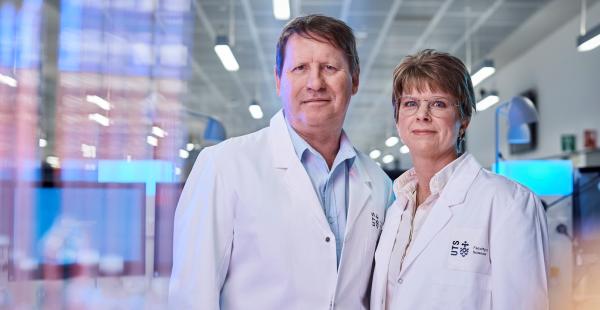For Professor Phil Hansbro, finding more effective treatments for chronic lung infections is one of the longest-standing health problems facing the community.
“Chronic obstructive pulmonary disease (COPD) – also known as emphysema – is the third largest cause of death in the world,” he says
“Asthma patients with severe disease, who make up less than a quarter of the total, take up between 50 and 80 percent of the treatment costs. Idiopathic pulmonary fibrosis patients have an average survival rate of two years.”.
“The burden of these diseases is incredibly high but treatment options are limited. They mainly target the symptoms of disease rather than underlying cause.”
“We’re looking at cures to stop the progress of or reversing these debilitating diseases.”
Inflammation ... is a set of pathways and networks that are the human body's immune response to a challenge
Professor Hansbro and his 50-strong research team at the Centenary UTS Centre for Inflammation take an holistic approach to this task, putting the pivotal role played by inflammation under the microscope.
“Contrary to what you might think, inflammation is not one single thing. Instead it is a set of pathways and networks that are the human body’s immune response to a challenge. And these pathways and networks are controlled by different molecules,” he says.
“We look at the big picture of how these diseases progress. Using animal models and human samples, we are exploring the genes and interactions of all the different cell types in the lungs.”
“From there, we can identify molecules that affect all the pathways and networks involved rather than just a single target.”
Inhibiting inflammation
Professor Hansbro’s revolutionary approach to discovering molecules that could control the inflammation process is shown in the identification of a promising new drug for treating severe asthma.
“We showed in asthma airway and immune cells interact with infections like chlamydia to drive more severe disease and that is more resistant to treatment,” he says.
“We discovered the role that a type of immune complex called an inflammasome drives inflammatory responses to this and other infection.”.
A team of researchers from Trinity College Dublin and the University of Queensland’s Institute of Molecular Bioscience developed a drug candidate to inhibit inflammasomes. Professor Hansbro’s team then further tested it as a potential treatment for severe asthma.
“We tested it in our animal models and it worked unbelievably well in making mice with severe asthma responsive to steroid treatments again.”
It worked so well, a start-up Inflazome Ltd was founded in 2016 to further develop the drug candidates. Just four years later, it was bought out by pharmaceutical giant Roche from approximately AU$620 million who are now further developing the drug.
Underpinning the healthcare ecosystem
Professor Hansbro makes new discoveries to combat respiratory disease. But he also believes it’s just as important to support other researchers, start-ups and large pharmaceutical companies that also play their roles.
“We can only do so much well, and the broader drug development ecosystem has radically changed in recent years. Different players now play different roles,” he says.
We do our own discoveries and drug development. But we also enable other people to use our models and tools to further our knowledge.
His team also worked with Australian drug development start-up Pharmaxis on a category of drug candidates known as amine oxydase inhibitors, that inhibit the development and progression of COPD.
One of their potential drugs was shown to be effective in Professor Hansbro’s models and was subsequently bought by Boehringer Ingelhiem for AU$750 million.
Professor Hansbro notes that these large pharmaceutical corporations have scaled back their early-stage drug identification and development.
Instead, they wait for others to develop potential drugs and then pay large sums to purchase the intellectual property which they then take to market.
“Together, we have made great strides in combating COPD and severe asthma. We’ve developed tools for progressing treatments and keep building the health research and care community that are finding solutions,” he says.


